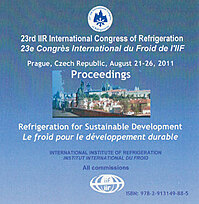
IIR document
Heat pumps using natural refrigerants for optimising efficiency and minimising environmental impact.
Number: pap. ID: 468
Author(s) : PACHAI A. C.
Summary
The increased focus on energy efficiency and sustainability has led to some regulatory initiatives that will help building owners get more sustainable and energy efficient buildings with potential operational cost reductions of the building. The heat pumps available in the market using natural refrigerants offer the possibility of producing hot water from a medium high temperature to a high temperature. There are many sources of heat in the modern society that can help achieving this. Computers and increasing demands on comfort increases the need on fresh air and cooling. This gives a lot of possibilities for heat recovery both at low levels but also relative high levels. Most of the heat is rejected at relative unattractive temperature levels but by using a heat pump you can reach very attractive temperature levels suitable for tap water and room heating. Some refrigerants are better for some types of applications than others. The efficiency is high and the operational costs are lower than the fossil power solution which makes heat pumps very attractive. A lot of heat is produced through cooling as a waste of the process. Most cooling plants are condensing at lowest possible condensing pressure to keep up the energy efficiency and not to loose cooling capacity at high ambient conditions. In industrial processes one of the most used refrigerants is ammonia (NH3). Using NH3 has it own sets of challenges to take care of but once these problems are dealt with, NH3 is a good and efficient refrigerant for the job. When working with the heat pump topic one comes to the point where you ask yourself: why does this not sell itself with the good prospects of making quick savings on the running cost and creating a green image at the same time? The answer could be the as simple as: The comfort zone of the individual engineer.
Available documents
Format PDF
Pages: 7 p.
Available
Public price
20 €
Member price*
Free
* Best rate depending on membership category (see the detailed benefits of individual and corporate memberships).
Details
- Original title: Heat pumps using natural refrigerants for optimising efficiency and minimising environmental impact.
- Record ID : 30003191
- Languages: English
- Subject: Environment
- Source: Proceedings of the 23rd IIR International Congress of Refrigeration: Prague, Czech Republic, August 21-26, 2011. Overarching theme: Refrigeration for Sustainable Development.
- Publication date: 2011/08/21
Links
- See translations: Bombas de calor que utilizan refrigerantes naturales para optimizar la eficiencia y minimizar el impacto medio ambiental.
See other articles from the proceedings (569)
See the conference proceedings
Indexing
-
Themes:
Heat pumps techniques;
Industrial heat pumps;
Ammonia;
CO2;
Hydrocarbons - Keywords: Heat recovery; Ammonia; Review; Heat pump; Hydrocarbon; Environment; Energy efficiency; Refrigerant; CO2
-
Desarrollo experimental de un prototipo de bomb...
- Author(s) : MATEU-ROYO C., NAVARRO-ESBRÍ J., MOTA BABILONI A., MOLÉS F., GONZALEZ-PIQUER M., BARRAGÁN-CERVERA A.
- Date : 2020/11/11
- Languages : Spanish
- Source: X Congreso Ibérico y VIII Congreso Iberoamericano de Ciencias y Técnicas del Frío, CYTEF 2020.
- Formats : PDF
View record
-
Theoretical analysis of transcritical HTHP cycl...
- Author(s) : ARPAGAUS C., BLESS F., BERTSCH S. S.
- Date : 2020/07/31
- Languages : English
- Source: IIR Rankine Conference 2020.
- Formats : PDF
View record
-
Industrial ammonia heat pumps and their challen...
- Author(s) : PACHAI A. C.
- Date : 2011/04/14
- Languages : English
- Source: 4th Conference on Ammonia Refrigeration Technology. Proceedings: Ohrid, North Macedonia, April 14-16, 2011.
- Formats : PDF
View record
-
Utilization of industrial low-grade waste heat ...
- Author(s) : BRONDUM P., MARKUSSEN M., REINHOLDT L.
- Date : 2011/04/14
- Languages : English
- Source: 4th Conference on Ammonia Refrigeration Technology. Proceedings: Ohrid, North Macedonia, April 14-16, 2011.
- Formats : PDF
View record
-
Challenges and solutions for next-generation ai...
- Author(s) : PEARSON S. F.
- Date : 2010/02/17
- Languages : English
- Source: Measures to address climate change. 2010 International Symposium on Next-generation Air Conditioning and Refrigeration Technology: February 17-19, Tokyo, Japan.
View record
